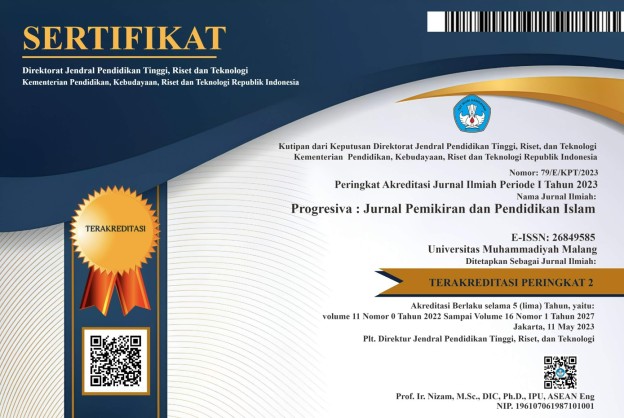Enhancing Green Campus Sustainability through Mental Model Development: An Islamic Perspective
DOI:
https://doi.org/10.22219/progresiva.v12i02.29872Keywords:
Green Campus, Learning, Organization, Mental ModelsAbstract
This study explores the pivotal role of mental model development in enhancing sustainability initiatives within green campuses. As universities increasingly strive to mitigate their environmental impact, understanding and fostering the mental models of students, faculty, and staff becomes crucial. Mental models, which are deeply ingrained assumptions and perspectives about how the world works, significantly influence individuals' behaviors and decision-making processes. By identifying and reshaping these mental models to align with sustainability goals, educational institutions can cultivate a more sustainable campus culture. The research employs a qualitative approach with data from university leaders and faculties. Data collection techniques are interviews, observation, documentation, and questionnaires. The researcher analyzed the data using Nvivo 12Plus software through 7 stages: open coding, axial coding, selective coding, matrix coding query, and word frequency query. The results of the analysis show that, through the democratic attitude of the leaders and staff in each unit, the campus community members can express their opinions and can be well received by the leaders and staff. With a resilient mentality, every problem can be adequately resolved, and they are able to appreciate and manage diversity and not impose their will. Leaders, with material rewards, appreciate the office boys or staff at UIN Raden Intan.
Downloads
References
Agarwal, S., Lenka, U., Singh, K., Agrawal, V., & Agrawal, A. M. (2020). A qualitative approach towards crucial factors for sustainable development of women social entrepreneurship: Indian cases. Journal of Cleaner Production, 274, 123135.
Aryadi, R. (2020). Aplikasi Testing Interface Video Graphics Array Card Menggunakan Vb. Net. Jurnal Sibernetika, 5(2), 209–215.
Auli, S., Diana, N., & Yuberti, Y. (2018). Analisis Miskonsepsi Siswa SMP pada Materi Fisika. Indonesian Journal of Science and Mathematics Education, 1(2), 155–161.
Baharun, H. (2018). Peningkatan kompetensi guru melalui sistem kepemimpinan kepala madrasah. At-Tajdid: Jurnal Ilmu Tarbiyah, 6(1), 1–26.
Collaço, N., Wagland, R., Alexis, O., Gavin, A., Glaser, A., & Watson, E. K. (2021). Using the Framework Method for the Analysis of Qualitative Dyadic Data in Health Research. Qualitative Health Research, 10497323211011600.
Ebrahimpour, M. (2020). Proposing a framework of biophilic design principles in hot and arid climate of Iran by using grounded theory. Civil and Environmental Engineering, 16(1), 71–78.
Elliott, V. (2018). Thinking about the coding process in qualitative data analysis. The Qualitative Report, 23(11), 2850–2861.
Faiz, A., & Kurniawaty, I. (2020). Konsep Merdeka Belajar Pendidikan Indonesia Dalam Perspektif Filsafat Progresivisme. Konstruktivisme: Jurnal Pendidikan Dan Pembelajaran, 12(2), 155–164.
Febrianingrum, L. (2020). Teacher’s Corrective Feedback On Students’oral Responses. English Community Journal, 4(1), 12–23.
Febrianty, F., Revida, E., Simarmata, J., Suleman, A. R., Hasibuan, A., Purba, S., Butarbutar, M., & Saputra, S. (2020). Manajemen Perubahan Perusahaan Di Era Transformasi Digital. Yayasan Kita Menulis.
FitzPatrick, B. (2019). Validity in qualitative health education research. Currents in Pharmacy Teaching and Learning, 11(2), 211–217.
Frühauf, A., Hardy, W. A., Pfoestl, D., Hoellen, F.-G., & Kopp, M. (2017). A qualitative approach on motives and aspects of risks in freeriding. Frontiers in Psychology, 8, 1998.
GINTING, B. F. (2020). Analisis Kinerja Guru Di Sd Negeri 046582 Lau Solu Kecamatan Marding-Ding Tahun Ajaran 2019/2020. UNIVERSITAS QUALITY.
Guo, J. X. (2019). Measuring information system project success through a software-assisted qualitative content analysis. Information Technology and Libraries, 38(1), 53–70.
Hamilton, J. B. (2020). Rigor in qualitative methods: An evaluation of strategies among underrepresented rural communities. Qualitative Health Research, 30(2), 196–204.
Hatta, M. (2020). Green leadership" the forest guard" from the upstream. EurAsian Journal of Biosciences, 14(2).
Hatuwe, R. S. M., Tuasalamony, K., Masniati, A., & Yusuf, S. (2021). MODERNISASI TERHADAP PERUBAHAN SOSIAL MASYARAKAT DESA NAMLEA KABUPATEN BURU. NUSANTARA : Jurnal Ilmu Pengetahuan Sosial, 8(1), 84–96.
Holtrop, J. S., Rabin, B. A., & Glasgow, R. E. (2018). Qualitative approaches to use of the RE-AIM framework: Rationale and methods. BMC Health Services Research, 18(1), 1–10.
Irmayani, H., Wardiah, D., & Kristiawan, M. (2018). The strategy of SD Pusri in improving educational quality. International Journal of Scientific & Technology Research, 7(7), 113–121.
Kabir, S. (2017). An overview of fault tree analysis and its application in model based dependability analysis. Expert Systems with Applications, 77, 114–135.
Karami, A., Farokhzadian, J., & Foroughameri, G. (2017). Nurses’ professional competency and organizational commitment: Is it important for human resource management? PloS One, 12(11), e0187863.
Kuwaitiningsih, A., Setiadi, I. K., & Iswanto, A. H. (2021). Pengaruh Organisasi Pembelajaran, Keterlibatan Karyawan Terhadap Komitmen dan Perubahan Organisasi Di RSJPDHK. JIMF (Jurnal Ilmiah Manajemen Forkamma), 4(3).
Liu, N. F., Gardner, M., Belinkov, Y., Peters, M. E., & Smith, N. A. (2019). Linguistic knowledge and transferability of contextual representations. ArXiv Preprint ArXiv:1903.08855.
Majid, N. F. (2019). Kontribusi Learning Organization Terhadap Readiness For Change Pada Pegawai Rumah Sakit X Kota Makassar. Universitas Hasanuddin.
Mangoting, Y., & Soengkono, M. (2019). Efek Leadership Style, Management Control System Dan Organization Commitment Terhadap Learning Organization. EQUITAS, 2(3), 427–446.
Martina, F., Syafryadin, S., & Utama, J. A. (2020). The Practice of extensive reading among EFL learners in tertiary level. Yavana Bhasha: Journal of English Language Education, 3(2), 56–72.
Mensah, J. (2020). Improving Quality Management in Higher Education Institutions in Developing Countries through Strategic Planning. Asian Journal of Contemporary Education, 4(1), 9–25.
Murtafiah, W., Sa’dijah, C., & Candra, T. D. (2018). Exploring the Explanation of Pre-Service Teacher in Mathematics Teaching Practice. Journal on Mathematics Education, 9(2), 259–270.
Nurhasanah, L. (2019). Penerapan Learning Organization dalam Mewujudkan Madrasah Ramah Anak di Mts Al-ihsan. Tatar Pasundan: Jurnal Diklat Keagamaan, 13(1), 109–120.
Patimah, S. (2020). Developing State Islamic University As a World-Class Center for Studying Islam. 1st Raden Intan International Conference on Muslim Societies and Social Sciences (RIICMuSSS 2019), 150–153.
Prabhawanti, R. D. L., & Prasojo, E. (2021). Analisis Pengaruh Manajemen Perubahan dan Kompetensi terhadap Kinerja ASN pada Biro Hukum Kementerian Pertanian. Transparansi: Jurnal Ilmiah Ilmu Administrasi, 4(1), 111–124.
Razi, F. (2021). Teachers’strategies In Teaching Speaking Skill To Junior High School Students. English Education Journal, 12(3).
Riadi, S., Ahiruddin, A., Kuswarak, K., & Purnama, H. (2021). Challenges Of Islamic Religious Higher Education In Indonesia: Qualitative Analysis Using NVivo Software. Journal Corner of Education, Linguistics, and Literature, 1(2), 114–121.
Rohmah, H. (2018). The implementation of herringbone technique in reading comprehension at second semester of Non-English Department. Celt: A Journal of Culture, English Language Teaching & Literature, 18(1), 64–78.
Sari, K., Patimah, S., Pahrudin, A., & Jatmiko, A. (2021). Research Credibility Analysis And Quality Test Of Supervisors At The Ministry Of Religion, Pangkalpinang City. International Journal of Educational Research & Social Sciences, 2(4), 722–729.
Sarmiento, C. P., Morales, M. P. E., Elipane, L. E., & Palomar, B. C. (2020). Assessment Practices in Philippine Higher STEAM Education. Journal of University Teaching and Learning Practice, 17(5), 18.
Sisca, S., Simarmata, H. M. P., Grace, E., Purba, B., Dewi, I. K., Silalahi, M., Fajrillah, F., Sudarso, A., & Sudarmanto, E. (2021). Manajemen Inovasi. Yayasan Kita Menulis.
Sundari, C., Nurmandi, A., Muallidin, I., & Kurniawan, D. (2021). Analysis of Secondary Education Services During the COVID-19 Pandemic. International Conference on Human Interaction and Emerging Technologies, 967–973.
Supriyanto, S., & Masrukhi, M. (2021). Evaluasi Pembelajaran Multikultural Pada Mata Pelajaran Pendidikan Kewarganegaraan, Sejarah Dan Sosiologi (Study Kasus: SMA Negeri 1 Purwodadi). Jurnal PPKn: Penelitian Dan Pemikiran Pendidikan Pancasila Dan Kewarganegaraan, 9(1), 1–5.
Suryanto, T., & Patimah, S. (2019). Strategy Analysis of Financing Management Quality toward Performance Improvement of Islamic Higher Education in Lampung. Journal of Education, Teaching and Learning, 4(2), 321–325.
Syukur, R., & Firmanto, A. D. (2021). Pengaruh Teknologi di Tengah Pandemi Bagi Sosialitas Remaja dalam Perspektif Armada Riyanto. Jurnal Filsafat Indonesia, 4(2), 202–210.
Tallon, P. P., Queiroz, M., Coltman, T., & Sharma, R. (2019). Information technology and the search for organizational agility: A systematic review with future research possibilities. The Journal of Strategic Information Systems, 28(2), 218–237.
Tarnanen, M., Kostiainen, E., Kaukonen, V., Martin, A., & Toikka, T. (2021). Towards a learning community: Understanding teachers’ mental models to support their professional development and learning. Professional Development in Education, 1–15.
Törmänen, J., Hämäläinen, R. P., & Saarinen, E. (2021). On the systems intelligence of a learning organization: Introducing a new measure. Human Resource Development Quarterly.
Vogel, S. K. (2018). The re-organization of organized capitalism: How the German and Japanese models shape their transformations. In The End of Diversity? (pp. 306–333). Cornell University Press.
Watkins, K. E., & Kim, K. (2018). Current status and promising directions for research on the learning organization. Human Resource Development Quarterly, 29(1), 1–15. https://doi.org/10.1002/hrdq.21293
Yuberti, Y. (2015a). Online group discussion pada mata kuliah teknologi pembelajaran fisika. Jurnal Ilmiah Pendidikan Fisika Al-Biruni, 4(2), 145–153.
Yuberti, Y. (2015b). Peran teknologi pendidikan Islam pada era global. AKADEMIKA: Jurnal Pemikiran Islam, 20(1), 137–148.
Yulianto, H. (2021). Pergeseran Paradigma Manajemen Sumber Daya Manusia. Cross-Border, 4(2), 141–153.
Downloads
Published
How to Cite
Issue
Section
License
Copyright (c) 2023 Heru Juabdin Sada

This work is licensed under a Creative Commons Attribution-ShareAlike 4.0 International License.


















